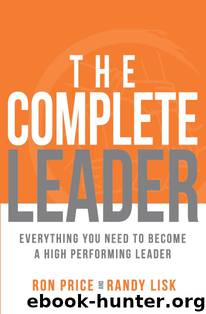The Complete Leader by Ron Price & Randy Lisk

Author:Ron Price & Randy Lisk [Price, Ron & Lisk, Randy]
Language: eng
Format: epub
Publisher: Aloha Publishing
Published: 2014-06-06T07:00:00+00:00
3.2
Understanding and
evaluating others
What Is Understanding and Evaluating Others?
When Randy was in grade school, he had classmates who were “identical” twins. Although they looked very similar, he could easily tell them apart because he was with them every day and knew them well. They obviously had many similarities; but, to someone who knew them well, they were not identical.
Understanding and evaluating others is the ability to see the individuality in others, recognize each person as a unique human being, and understand a person’s unique point of view and attitudes. Think of one of your best friends. Do you have any trouble getting him confused with someone else? Probably not, if you are endowed with a normal brain. You can easily create a long list of qualities and quirks that make him who he is. The better you understand another person, the more you can put him in a unique class of one: there is no one else exactly like him.
What about people you meet in another part of the world, where you are perhaps unfamiliar with the language, culture, customs and dress? It may be much harder to describe how each person is different from the other because it can be easier to lump everyone into one large group. You might label them. In this process they become the “other,” slightly less human and more like “things.”
We do not deny that cultural similarities exist within groups of people. What we are saying is that, underneath those similarities, each individual possesses unique values, experiences and aspirations.
Another part of understanding and evaluating others is the ability to objectively listen to their ideas. You do not have to agree, or even imply agreement, with all their ideas or opinions. It is very possible to understand another person’s viewpoint, even to be able to express it as well as he can, and not be in agreement with him. Doing so involves listening to the other person objectively and attentively.
“The most basic of all human needs is the need to
understand and be understood.”
– Ralph Nichols
The objective listener values all other points of view. She asks for others’ thoughts and ideas. She listens to understand the other person’s point of view, without bias, using her listening skills of both empathy and understanding others. Evaluating does not equal judging, as in the sense of an annual evaluation. In fact, “evaluating” means unbiased weighing of ideas.
A person who lacks the ability to understand and evaluate others attempts to simplify his world by putting people in groups—sales and manufacturing, Muslims and Christians, introverts and extroverts, Boomers and Millennials, Chinese and Indians. He evaluates people in those groups and their ideas through a biased lens, as if all members are identical. In this case, he will not truly understand, respect and value the diversity of others and their beliefs. This type of person may not properly understand what is required by his manager or why. He may not recognize the distinct talents of his employees or the individual
Download
This site does not store any files on its server. We only index and link to content provided by other sites. Please contact the content providers to delete copyright contents if any and email us, we'll remove relevant links or contents immediately.
Hit Refresh by Satya Nadella(9118)
The Compound Effect by Darren Hardy(8919)
Change Your Questions, Change Your Life by Marilee Adams(7733)
Nudge - Improving Decisions about Health, Wealth, and Happiness by Thaler Sunstein(7689)
The Black Swan by Nassim Nicholas Taleb(7101)
Deep Work by Cal Newport(7058)
Rich Dad Poor Dad by Robert T. Kiyosaki(6600)
Daring Greatly by Brene Brown(6501)
Principles: Life and Work by Ray Dalio(6408)
Playing to Win_ How Strategy Really Works by A.G. Lafley & Roger L. Martin(6213)
Man-made Catastrophes and Risk Information Concealment by Dmitry Chernov & Didier Sornette(6001)
Big Magic: Creative Living Beyond Fear by Elizabeth Gilbert(5749)
Digital Minimalism by Cal Newport;(5747)
The Myth of the Strong Leader by Archie Brown(5491)
The Slight Edge by Jeff Olson(5407)
Discipline Equals Freedom by Jocko Willink(5376)
The Motivation Myth by Jeff Haden(5202)
The Laws of Human Nature by Robert Greene(5165)
Stone's Rules by Roger Stone(5079)
